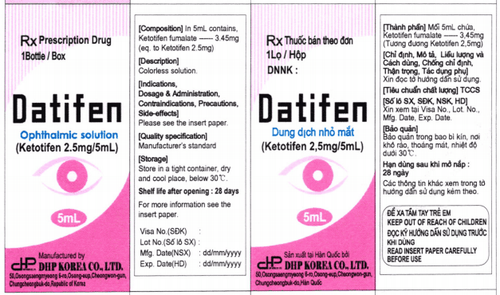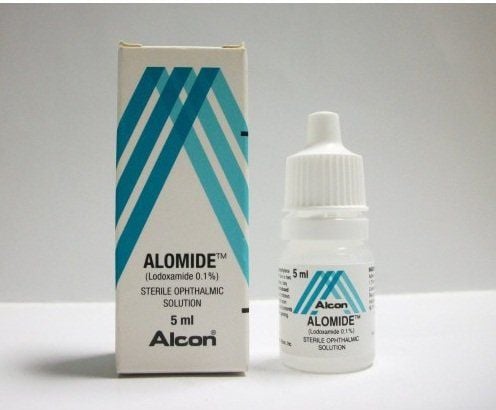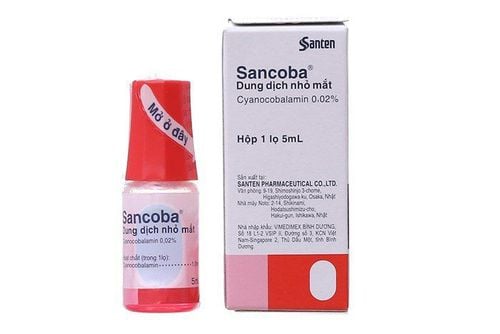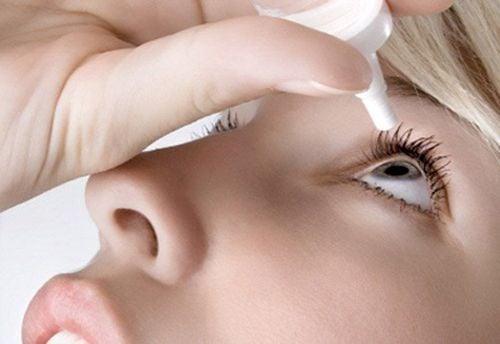This is an automatically translated article.
Polyuphace is a drug used for treatment in ophthalmology, containing the main ingredients are Dexamethasone, Chloramphenicol, Naphazoline and Sodium phosphate. The drug is used to treat eye diseases such as: acute conjunctivitis, eyelid inflammation, corneal ulceration... So what is Polyuphace drug, what is the clinical effect of the drug, please read for reference. Refer to the following information in the article Polyuphace drug use.1. What is Polyuphace?
Polyuphace is used in the treatment of inflammatory diseases and infections around the eyes such as corneal and conjunctival diseases, after eye surgery ... thanks to the synergistic effect of the pharmaceutical substances Dexamethasone, Naphazoline, Chloramphenicol and Sodium phosphate contained in Polyuphace. medicine.Dexamethasone (fluomethylprednisolone) is a synthetic glucocorticoid. Dexamethasone binds to cell receptors and translocates into the nucleus, where it affects a number of genes that are translated. Dexamethasone has anti-inflammatory activity, is a potent antiallergic and immunosuppressive agent. Drugs are well absorbed at the site of administration, even when administered by drip. Chloramphenicol is an antibiotic isolated from the bacterium Streptomyces venezuelae, which is now produced synthetically. This antibiotic usually has a bacteriostatic effect, which can kill bacteria when the concentration of antibiotics is high or when there are groups of highly sensitive bacteria. Chloramphenicol inhibits protein biosynthesis in susceptible bacteria by binding to the 50S subunit of the ribosome. After topical application in the eye, the drug is absorbed into the aqueous humor, distributed in the vitreous. Naphazoline is a vasoconstrictor, sympathetic nervous system stimulant, anti-congestive, red, itchy or watery eyes.
2. Indications and contraindications of Polyuphace
Polyuphace drug is indicated in the following diseases:
Acute conjunctivitis, keratitis, corneal ulcer disease, infection of the lacrimal gland, eyelid inflammation, decontamination before and after eye surgery. .
Polyuphace drug is not used in the following cases:
Patients with hypersensitivity or allergy to the ingredients: Dexamethasone, Chloramphenicol antibiotics, Naphazoline or other drug excipients. Patients with viral or fungal infections in the eyes, styes. Patients with Glaucoma are accompanied by eye damage or not. Do not use Polyuphace for infants, patients with myelosuppression.
3. Dosage and how to use Polyuphace
3.1. How to use Polyuphace is used by eye drops.
The patient needs to wash both hands. One hand holds the vial, prevents the face, the other hand supports instillation, depending on the location of the eye drops in the conjunctiva, cornea or eyelids of the affected eye. Close the lid of the Polyuphace vial after use.
3.2. Dosage: Instill from 1 drop to 2 drops in each affected eye, can be used several times a day.
The duration of the drug can last about 10 days.
4. Undesirable effects when using Polyuphace drug
Undesirable effects in the process of eye drops Polyuphace include: Irritation at the eye drop site such as transient mild stinging in the eyes, eye stinging, allergic reactions... During the use of Polyuphace if If the patient feels discomfort at the place of taking the drug or signs of a general abnormality, please inform the doctor.
5. Notes in the process of taking Polyuphace
Polyuphace drug is considered a safe drug, with few unwanted effects because the drug has a local effect. Patients should note the following issues when using Polyuphace:
Eye drops can be used several times a day when starting to use the drug, the time to use each time is 1-2 hours, after gradually taking 3-day intervals. 4 times, but the total duration of use should not exceed 10 days. Polyuphace is not recommended for pregnant and lactating women. Patients who need to drive a vehicle, need to be awake to operate machinery can feel secure during the course of taking the drug, should avoid symptoms of eye discomfort after instillation.
Please dial HOTLINE for more information or register for an appointment HERE. Download MyVinmec app to make appointments faster and to manage your bookings easily.













